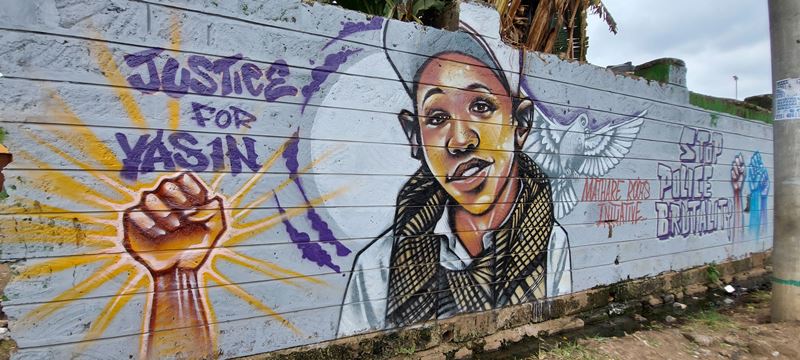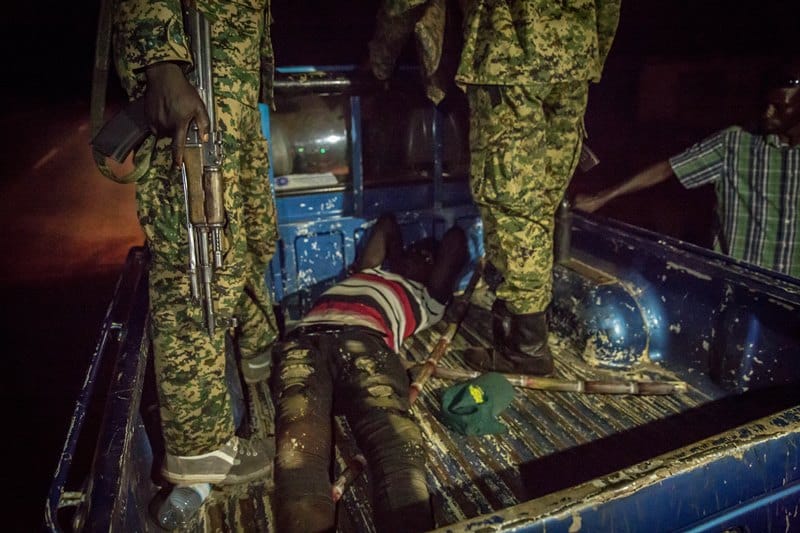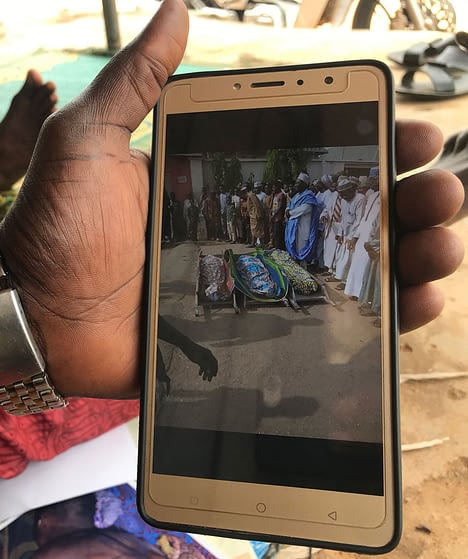Africa's Hidden Victims:
Pandemic Prompted Surge in Police Brutality
By Sally Hayden, Maurice Oniang’o, Linus Unah and Patrick Egwu
WARNING: The content you are about to see contains some graphic images and some viewers may find them disturbing.
Africa’s Hidden Victims was produced and co-published in collaboration with Journalists for Transparency, a project of Transparency International, and is being co-published with 100Reporters and Africa.com.

In Nairobi, a teenage boy standing on his balcony became Kenya’s first victim of police brutality in enforcing coronavirus restrictions. In Lagos, Nigeria, police shot and killed a young gas station attendant who came to the aid of a customer the officers were harassing. In Uganda, police used the threat of throwing people into overcrowded prisons, which were potential Covid-19 hotspots, to extort money.
The coronavirus pandemic, slowly beginning to lift as vaccines become available, laid bare how normal violence by security forces has become in parts of Africa. Reports from four countries–South Africa, Nigeria, Kenya and Uganda–found deeply-rooted problems of corruption and brutality flourished amid the pandemic. The tighter the restrictions, the greater the opportunities grew for extortion or brutality. Many, if not most, of the resulting deaths will never be counted.
The problem starts from training, whereby police recruits are brutalized in the name of being trained. So when they graduate, they extend the same brutality they received during training to members of the public.
George Musamali
Security and Safety Consultant
“The problem starts from training, whereby police recruits are brutalized in the name of being trained,” said George Musamali, a security and safety consultant who served in the Kenya police for more than ten years. “So when they graduate, they extend the same brutality they received during training to members of the public.”
Amid a flurry of predictions about how badly Africa could be affected by the pandemic, governments imposed lockdown measures on an unprecedented scale, with little warning. Across a continent where hundreds of millions of people live hand-to-mouth, citizens in countries with strict restrictions couldn’t afford to abide by them, which stoked confrontations. This heavy-handed policing in enforcing the coronavirus restrictions has led to deaths and devastated many families.
However, Musamali notes that police brutality is not a new phenomenon in most African states, but stems from a culture of impunity that dates back to the colonial period. “In Kenya, we created the police service in 1900, and the reason behind that was that the colonial government wanted the police to protect the lives and property of the white settlers,” he said.
“The training was focused on that, whereby the police were pitted against the locals, and they were there to protect the settlers. ” he added.
Law enforcement officials dispute the charge that their training has not equipped them to deal with such a pandemic.
“We are socially trained to enforce laws and regulations,” said Charles Owino, the outgoing spokesman of Kenya’s National Police. He says that the rise in police brutality has nothing to do with the training or the police as an institution, but represented isolated incidents. “We are more than 120,000, but you may find one, two, or three making mistakes. These mistakes don’t arise from poor training but from several issues, and one is the inherent behavior of the individual,” he said. He added that some individuals might have been bullies even before joining the police service.
In most countries in the continent, the police training curriculum is based on dealing with lawlessness, civil unrest, and disobedience. However, the pandemic presents a different challenge to police officers as they enforce rules and restrictions to protect the public from a disease.
The pandemic exposed and exacerbated existing issues around trust and accountability of the security forces. A lot of these negative behaviours have been condensed into a short timeframe. And then it's happening on a scale that hasn't been seen before.
Cindy Chungong
Africa programmes director at International Alert
“The pandemic exposed and exacerbated existing issues around trust and accountability of the security forces,” said Cindy Chungong, the Africa programs director at International Alert, a nonprofit that works to break cycles of violence. “A lot of these negative behaviors have been condensed into a short timeframe. And then it’s happening on a scale that hasn’t been seen before.”
Restrictions on transport and gatherings coupled with the wide geographic spread of the abuses have hampered human rights organizations charged with documenting how many people have been injured or killed by security forces during this period.
According to human rights organizations and the police oversight on extrajudicial killings, 2020 was the deadliest year for police brutality reports in Kenya. By mid-April 2020, a month into the pandemic, Kenya had recorded only 12 confirmed COVID-19 deaths, but police had already killed 18 people while enforcing lockdown restrictions, according to the National Human Rights Commission.
The Independent Policing Oversight Authority received 95 complaints of police brutality in the first three months after the curfew was imposed.
In March of this year, Missing Voices, a Kenyan civic group, tallied 157 police killingsrelated to the pandemic across 2020. Another report prepared by a consortium of Human Rights organizations reports 2020 as one of the worst years regarding police brutality and extrajudicial killings in Kenya.
“In case a person lost their life it is regrettable,” said the police spokesperson. “We do not support any officer acting out of the law and for that reason we take stringent action against them. Where it borders criminality, we have the officer charged accordingly.” He added that the officers are relieved off their duty before being taken to court. Despite the tough talk, only two police officers in Kenya faced prosecution for alleged brutality during the pandemic.
Anne Okutoyi-Muchimuti, the Director of Research, Advocacy and Outreach at the Commission on Human Rights, said police mistreatment of people living in informal settlements “continuously go unreported.
“We must take a step back and reflect as a nation on ways in which we can stop this violence” she said.
The First Shot
In Kenya, the killing began with 13-year-old Yassin Moyo, who was standing on a balcony in Kiamaiko neighborhood of Nairobi, on March 13. Yassin was struck in the stomach by a stray police bullet.
“I know my child is in paradise,” said Yassin’s father, Hussein Moyo Molte. “But the officer really wronged me. He was a child. I was hoping that he’ll be the one to bury me, not the other way round”.
A police officer accused of shooting Yassin Moyo was charged with the murder and he pleaded not guilty. He was granted a one million shillings cash bail. The case is currently ongoing. With time, the grief of Yassin’s family has deepened. “The laughter and happiness that was always here is no more,” his father said.
“They were about 20 of them on the lorry, but the ones who were beating me were about six and when I pleaded with them, they told me that it is only God who forgives,” he said. After the beating, the officers tried to take Owide’s motorbike, but he managed to escape. He ran to his brother’s place, which was closer than his home. He lost consciousness at the door and woke up in Kenyatta National Hospital, where he received treatment for head injuries. After two months of recovery, he emerged deeply in debt. No police officer was charged with his assault.


Killed for a Nickel
Police in several countries turned on citizens who came to the aid of others upon witnessing abuse. In Ol Lessos, Nandi, in western Kenya, police shot a disabled shoe cobbler, Lazaro Tirop, in the head in June. Tirop had tried to intervene when a police officer arrested a motorcycle taxi driver for not wearing a mask. The officer asked for a 50 shilling bribe (5 cents). Later that day, when villagers went to the police station to protest, two more victims were shot dead in unclear circumstances.
Tirop left behind a wife and four children. His wife, Eunice Cheptoo, wanted justice and compensation so that Chebwai’s children could continue with school.
“He was our breadwinner and now that is gone. I am appealing to the government to support me and my children,” she said.
In the aftermath, all police officers serving at Ol Lessos police station were transferred to other parts of the country. In July, Police Constable Sammy Onyango was charged with murdering Lazaro Tirop and the case is ongoing.

Similarly, in southeastern Nigeria, police killed a gas station attendant, Chibuisi Okameme, who rushed to the aid of a customer the police began beating at the pump in the city of Aba. Nigerian police did not respond to a request for comment.
Months later, Okameme’s death remained fresh and painful to his manager at the gas station.
“[They were] beating him mercilessly,” recalled Ndubuisi Nwabeke, Okameme’s manager. The attendant recognized the customer who police were beating and, moved by compassion, begged the police to let the man go. In response, the officer in charge shot Okameme, who was only 26. He died two hours later.
A co-worker, Veronica Uche, burst into tears when she started talking about his death. “He was very playful and didn’t look for trouble,” said Uche, 26.
“He was too good; anybody that has worked here will tell you the same thing about him.”
The officer involved in the killing wrote an apology letter to the gas station, and authorities said he was dismissed, but Okameme’s friends and family are demanding justice and seeking compensation for their loss.
His widowed mother, Alaoma Chikezie, worried that she wouldn’t survive the heartbreak. “He was a good son to me,” she said, crying. “He called me every day to ask me how I am doing. As the good child that he is, he had started molding blocks that he would have used to build a house for me.”
Okameme was buried on March 26, just two weeks into the pandemic.

The institution is not strong and it does not have the technical resources to ensure that police officers face disciplinary actions. Out of the reports we documented and sent to the commission during the pandemic, we have received feedback in only a few cases.
Ruth Eguono
Olofin Program Manager CLEEN Foundation
The CLEEN Foundation, a local nonprofit working to promote public safety, security, and access to justice, deployed over 700 observers to Nigeria’s 36 states to monitor and document human rights violations as the coronavirus pandemic spread.
Ruth Eguono Olofin, the organization’s program manager, said, “Justice has not been served in the bulk of the cases we presented” to several government agencies, including the National Human Rights Commission and the Police Service Commission, which disciplines erring officers. The Police Service Commission, she added, is grappling with a backlog of cases.
“The institution is not strong and it does not have the technical resources to ensure that police officers face disciplinary actions,” she said. “Out of the reports we documented and sent to the commission during the pandemic, we have received feedback in only a few cases.”

In Uganda, police violence represents one kind of brutality, and indeed, more than a dozen Ugandans said in interviews that police had beaten and robbed them for violating curfews that began in March 2020.
However, police have also exploited the public’s fear of arrest and incarceration to demand bribes. The country’s overcrowded jails and prisons were potential hotspots for Covid-19, and if bribes were not paid to the arresting officer, the price of freedom went up.
The same month the lockdown began, local media reported that three prisoners were shot dead trying to escape a prison in Arua, southwest Uganda, where they feared contracting coronavirus in the prison’s cramped conditions. Over the next five months, the number of prisoners in Uganda surged 10 percent to 65,000, with the facilities crammed with more than three times their intended capacity.
We would like the Ministry of Health to tell us if they're totally incompetent, or they're totally defeated, in detecting (the) COVID-19 pandemic. Maybe they do not know what they're supposed to do. Because you cannot let more than 150 people get infected.
Gilbert Olanya
MP for the Kilak South constituency
In Amuru prison, in northern Uganda, 153 inmates and the warden tested positive for COVID-19 in August, prompting authorities to shut down the prison and transfer inmates to Gulu, a city 30 miles (55km) away. Days afterwards, Gilbert Olanya, the MP for the Kilak South constituency, in Amuru district, said he wasn’t sure how it could have taken so long to detect the cases.
A month later, more than 200 inmates escaped a prison in Karamoja, an impoverished northeastern region in Uganda. Two more escapees were killed as security guards pursued them.
Opportunity for Extortion
The risk of getting COVID-19 in prison presented an opportunity for corrupt police officers, and left many Ugandans with a stark, potentially fatal choice if they are caught outside after hours: pay a bribe or get a jail term.
Richard Onencan, a 25-year-old shopkeeper in Gulu and father of a four-year-old girl, said he was caught by a policeman half an hour after curfew last May. Onencan had been with his sick sister in hospital, returning to close up his kiosk for the night.
Onencan said the policeman and four soldiers brought him to a vehicle nearby and told him to pay 50,000 Ugandan shillings ($13.52), the total takings he might earn in a day at the kiosk, not including the cost of purchasing the sugar, sweets and toilet paper he sold. “I said no, I can’t pay that… I’ve not yet explained why I am out at this time,” he recalled telling them. “You take me where you want to take me.”
He was brought to the police station and told to write a statement, then put in a small cell with around 30 other people, the majority of whom had also been accused of violating coronavirus restrictions. “The space was not enough so I stood up until morning.”
He felt at huge risk of contracting coronavirus. “We have not any social distance… you cough near your friend. There is not any option to avoid (them). We were not having masks,” Onencan recalled.

The detainees would sit and stand in shifts, getting a maximum of 30 minutes on the floor to rest. Outside, his friends and relatives pooled savings to pay 150,000 Ugandan shillings ($40.54) to the police to find out where his file was being held, and another 250,000 Ugandan shillings ($67.61) to someone in the office of Gulu’s attorney general to get him released. Once out of jail, Onencan needed to pay that money back.
The shopkeeper said he was told if his family had refused to pay, he would have served at least six months in prison, and risked being charged with attempted murder.
He was never given a charge sheet, or a receipt for the payments his friends and family made. By the time he left the police cell, he had lost so much weight that his belt wouldn’t hold up his trousers anymore.
He said he needs to keep working to survive, and to support his young daughter and his sister who is ill. He’s started to farm, and is planting vegetables, instead of selling goods at the kiosk. “Before COVID-19 started I was working (a) good business, but when COVID-19 began the business has gone down.”

Calls for reform
“Abusive policing isn’t just an African problem. But it is pervasive across so many African countries that, you know, that question is appropriate,” said Mausi Segun, the Human Rights Watch Africa director, speaking from Abuja. She said there is a “foundational failure of the institutions to be fit for purpose”, and African police forces have long treated citizens like “subjects”.
“You can’t build on a faulty foundation,” Segun said.
She observed that low-income people tend to suffer violence disproportionately, no matter where they are in the world.
“If you look at the trajectory of police excesses: the excessive use of force, the use of lethal weapons to contain civil demonstrations – most of the time peaceful – they are usually utilised predominantly in low-income communities,” Segun said. “The economic status and the social status of the victims play a huge part in the way that they are treated by police.”
Amid the pandemic, Segun acknowledged that accurate counts of brutality are hard to nail down. At the same, she said, it was crucial to document specific cases to represent the wider problem, and to restore dignity and humanity to the victims of police violence, even in death.
Chungong, at International Alert, said the coronavirus pandemic has highlighted the need for a move towards community-centered policing that addresses the root causes of crime and insecurity, rather than using the police as a “repressive force” who are “protecting the interests of a particular group.”
Security officers who misbehave must face sanctions, with institutional mechanisms for meaningful oversight, she added. That means reforming recruitment practices, training, workplace culture, and remuneration, Segun said. “Otherwise, what we have is a system that permits and actively encourages impunity.”
Get the right people in the service, and then look into their welfare, train them properly, equip them properly and you will see that they will change the way the police operate
George Musamali
Security and Safety Consultant
Musamali, the Kenyan security consultant, agreed that, perpetrators of police brutality need to be brought to book. The executive should not only train police on how to handle the public but also address the welfare of cadets and officers.
“Get the right people in the service, and then look into their welfare, train them properly, equip them properly and you will see that they will change the way the police operate, ” he said.
Africa’s Hidden Victims was produced and co-published in collaboration with Journalists for Transparency, a project of Transparency International, and is being co-published with 100Reporters.